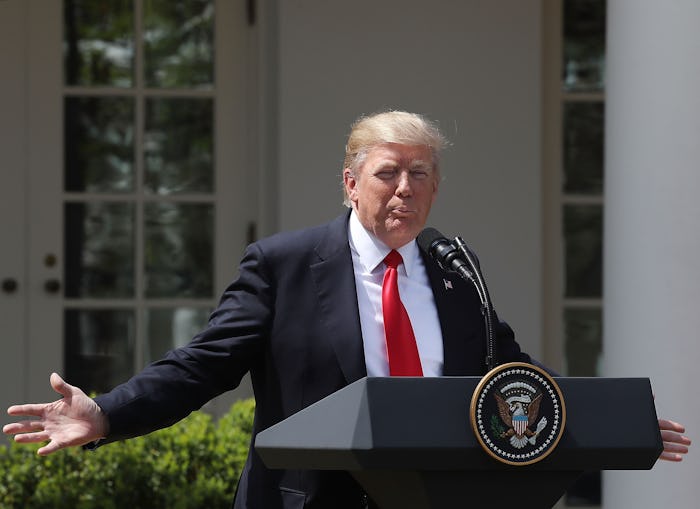News

Is The U.S. At War With Syria Now?
In response to a deadly chemical weapons attack thought to have been launched by Syrian President Bashar al-Assad earlier in the week, President Donald Trump announced Thursday night that he had authorized a "targeted military strike" on Syria's Al Shayrat airfield, according to The New York Times. Nearly 60 Tomahawk missiles were fired by the U.S. military from the Mediterranean Sea, a retaliatory move presumably meant to send a message to the Syrian leader, whose chemical attack is thought to have killed at least 100 people. Is the U.S. at war with Syria now? There's no doubt that Trump's military action is a major departure from former President Barack Obama's response to Syria, and is one that suggests he might not be opposed to further military involvement in the country. But many questions remain about what the actual implications of the airstrikes will be moving forward. If Trump does intend to escalate a military response against Assad, it's also possible he might not actually need to declare war in order to do so.
In the past, Trump has been a vocal opponent of military involvement in Syria, according to CNN, and once tweeted, "what will we get for bombing Syria besides more debt and a possible long term conflict?" But the brutality of the recent chemical attack — and the excruciating photos that emerged as a result — seemed to have changed his perspective on the issue: on Wednesday, Trump called the attack "an affront to humanity," and noted that the fact that "innocent people including women, small children, and even beautiful little babies," were killed meant that "[his] attitude toward Syria and Assad has changed very much."
That's a pretty significant departure from the Trump administration's position on Syria thus far. While Trump had long vowed to take down ISIS and fight terrorism, his entire campaign strategy — as well as his policy initiatives following his inauguration — focused largely on protecting United States national security, and putting "America first." As a result, U.S. Ambassador Nikki Haley told reporters last month that bringing down Assad was no longer a priority of the United States government, according to Reuters, and that the Trump administration would instead be focusing on "defeating ISIS and al Qaeda and preventing Syria from being used as a terrorist safe haven." A day later, Secretary of State Rex Tillerson said that, ultimately, Assad's future in Syria would "be decided by the Syrian people," not by the United States.
The turnaround certainly appears to mean that Trump's initial approach to foreign policy may be shifting dramatically, but it's also much too early to know for sure whether Americans should be bracing themselves for an ongoing military intervention in Syria. For one, as a one-off military strike specifically launched in response to the chemical attack, Trump's decision has been reasonably well-received by world leaders. According to The Telegraph, in a joint statement, French President Francois Hollande and German Chancellor Angela Merkel said that "President Assad alone carries responsibility," for the United States-led attack, due to his "repeated use of chemical weapons and his crimes against his own people." Similarly, Japanese Prime Minister Shinzo Abe responded by saying that the missile launch was "a means to prevent further deterioration of the situation" in Syria. But a continued military attack would likely be a different story.
One major issue? The debate about the need for congressional approval. According to Bloomberg, the 1973 War Powers Resolution requires that the President must consult with Congress before sending troops into combat unless there already had been a declaration of war — and an official declaration of war also requires congressional approval. That's meant to be an important part of the process of checks and balances that accompanies military action, but although White House officials have said that Trump did make Congress aware of his plan to launch an attack in Syria, it doesn't seem as though he actually had approval to do so.
That doesn't entirely mean the attack was unauthorized though: according to ABC News, presidents generally have the ability to respond militarily in a limited way to a crisis without express congressional approval, and a number of politicians — even those who often disagree with Trump — supported the move. In a joint statement, Arizona Sen. John McCain, and South Carolina Sen. Lindsey Graham, both vocal critics of the president, applauded Trump's swift action, and said, that he "deserves the support of the American people" for the fact that he "confronted a pivotal moment in Syria and took action."
If Trump plans to continue with military force in Syria though, he'll likely be expected to answer to Congress. That likely won't be by asking for a full declaration of war — the last time that actually happened in the United States was after the Pearl Harbor attack in 1941, according to TIME — but could be through the proposal of a new Authorization for Use of Military Force (AUMF). In 2001, an AUMF was passed to allow United States military involvement in Afghanistan after the Sept. 11 attacks, allowing "force against those nations, organizations, or persons" that were involved. But using an AUMF is controversial, and Congress might not allow it: according to ABC News, Obama did not receive approval for a new AUMF against Libya in 2011.
What's more though is that the conflict in Syria is extremely complex, and there's no way in which a United States-led military effort would be straightforward, particularly given the involvement of Russia in backing the Assad regime. For now, it seems unlikely that Trump's move in Syria is indicative of a war or anything similar. But given that Thursday's strike has once again proven the president to be highly unpredictable, there is no way of knowing for sure at this stage.